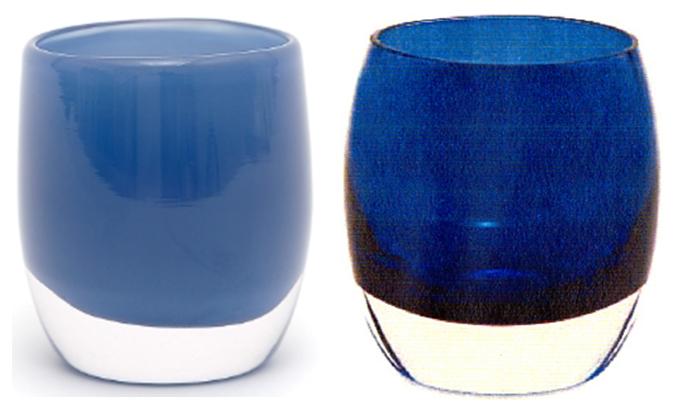 Generic! The Western District finds Glassybaby’s
Generic! The Western District finds Glassybaby’s
design (left) is incapable of functioning as a trademark
Glassybaby’s popular votive candle holder design is generic.
The Western District made that finding on Sept. 30, granting the motion for summary judgment that defendant Provide Gifts, Inc., d/b/a Red Envelope, brought attacking Glassybaby, LLC’s trade dress claim.
Western District Judge Marsha Pechman previously had dismissed the Seattle company’s complaint against the defendant sellers and manufacturers of competing votive designs for failing to describe its claimed trade dress. (STL post here.) After allowing Glassybaby to amend its complaint, the court found the company wrongly relied on the Patent and Trademark Office’s conclusion that Glassybaby’s trade dress was not generic.
“Glassybaby’s trade dress is generic and incapable of trademark protection. The mark describes the rough dimensions of a round glass container with convex sides, a thick, clear base, and a wide top. The mark only answers the question ‘what-are-you’ not ‘who-are-you.’ It gives no indication of the source and merely describes on particular species of the genus of round containers. Permitting trade dress protection for this item would also unnecessarily grant Glassybaby protection over a broad number and types of small, round containers, which runs contrary to the principles behind extending Lanham Act protection to trade dress. This is similar to the outcome in a case before the Second Circuit, relied on by Defendants: Jeffrey Milstein, Inc. v. Gregor, Lawlor, Roth, Inc., 58 F.3d 27 (2d Cir. 1995). The court there found die-cut greeting cards cut in the outline of color photographs of an animal, person, or object were generic because the product design only described a species of a genus, not a source-identifying trade dress. Here, with even less concrete detail of the product, nothing about the unregistered trademark identifies the source of what is simply a type of round, glass container approximately 3.75 inches high and 2.5 inches wide. This is simply a species of the genus of round containers and is generic as a matter of law.
“Glassybaby has not raised any dispute of material fact showing that its trade dress is not generic. Glassybaby primarily relies on the PTO’s finding that the unregistered trade dress is not generic. Yet, nowhere has Glassybaby explained why the Court is bound by that determination. At best, in a direct appeal from the PTO, which this is not, the Court reviews the PTO’s findings for substantial evidence. Here, the PTO’s finding is not supported by substantial evidence and fails to consider or apply the relevant authority. The PTO merely concluded that ‘products that combine the curved sides and thick, clear base with the specified dimensions [presented by Glassybaby] do not appear to be so commonly available for sale as to support a finding that the mark is generic.’ The PTO does not strictly apply the legal test for genericness or explain why the number of similarly sized and shaped votives impacts the determination of genericness. The PTO’s conclusion is at odds with Ninth Circuit law. A trade dress for a product design that answers only the ‘what-is-it’ question is generic. The Court is convinced Glassybaby cannot pass this test with its trade dress, regardless of whether there [are] abundant or few similarly sized and shaped glass containers. The PTO’s finding does not suffice to raise a genuine issue of fact.”
The court dismissed Glassybaby’s claims for dilution and violation of the Consumer Protection Act for the same reasons.
The court’s finding could have a big impact on Glassybaby. Its conclusion that the company’s product design is incapable of protection would seem to allow competitors — under trademark principles at least — to copy Glassybaby’s trendy design without liability.
The New York Times last week coincidentally featured Glassybaby’s challenges in breaking into the New York market. The company may face an even more significant challenge following the court’s order.
The case cite is Glassybaby, LLC v. Provide Gifts, Inc., No. 11-380 (W.D. Wash. Sept. 30, 2011) (Pechman, J.).